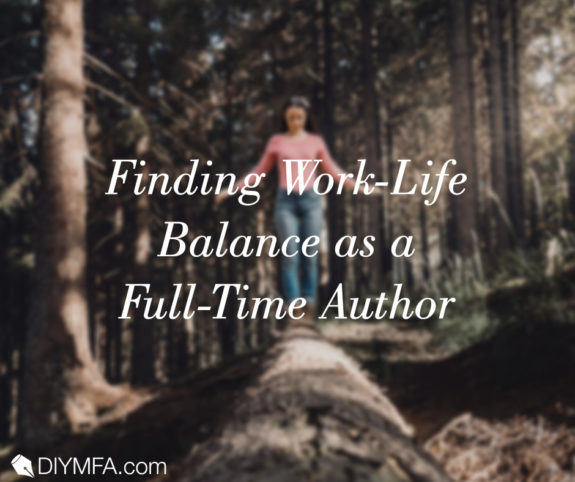As I sit here writing about how to be a full-time author AND take weekends and evenings off, creating that perfect work-life balance, there is some real irony in the fact that it is currently Saturday afternoon. But to my defense, it is just a few days before I release a new book.
While September has not been a month in which I’ve only worked during the weekday, I can say that most months, I’m able to keep my working hours . . . manageable.
The truth is I’m no expert and I’d be lying if I said I didn’t work at night after my daughter went to sleep or never turned on my computer on a Sunday morning. But over the past year, I’ve made it a priority to strive toward work-life balance and I’ve learned that I’m far more effective when I’m rested and not overworked. I don’t write particularly well at midnight. I don’t do anything particularly well at midnight, except binge Netflix and then regret staying up until two because my body doesn’t allow me to stay asleep past 7 am no matter what time I go to bed.
So yes, I’m writing this on a Saturday, but yesterday I took the day for myself. I spent the afternoon with a friend, relaxed, had a lovely dinner, came home, tackled a few emails, and then spent the rest of the evening with my family. I traded Friday off for a Saturday workday and, to me, that is one of the best things about having an author’s schedule.
It wasn’t always like this.
The first five years of my writing career were a blur of deadlines, late nights, and juggling two jobs. I was hungry for storytelling, my brain was on fire with ideas, and I sucked at time management. I tried to work from 8pm until midnight, then sleep, go to my day job, where I would forgo lunch so I could squeeze in twenty minutes of authoring, then sneak in another hour before I drove home, picked up my daughter, tried to mom and make dinner, and tackled bedtime with a child who thought sleep was for the weak.
Wash, rinse, repeat.
Needless to say I became an overworked, overwhelmed shell of a person. I knew that even after I quit my day job, I’d have to figure out the best way to manage my time and while I’m not a master, I think I’ve come up with effective strategies for creating a work-life balance.
Have a Plan and Write It Down
Lists are your friend.
I love lists. They’re a visual reminder of what needs to be done and every time I put a checkmark beside an item, I experience a surge of gratification. I start most days with a list, especially if I have a number of things that need my attention. I organize the list from most important/pressing to least important.
Some days I get everything done. Some days the least important items get moved to the following day. But making a list keeps me accountable and helps me stay focused.
Set Realistic Goals
Pick a writing goal that is manageable for you. If you’ve never written ten thousand words in one day, don’t set that as a goal. I think the most I’ve ever written in one day is 8k and the next day I was basically useless. I was exhausted and my brain felt like it was leaking out of my ear. I had that one banner day, but was it really worth it in the long run? Probably not.
When I was writing part-time and working another job, it was very, very challenging to move projects ahead. Carving out writing time between family obligations, work, and life can be difficult. Writing time is precious, and setting reasonable word goals is essential to avoid feeling defeated. Some authors can write like the wind, some plod along slowly.
Know your pace, set your goals accordingly.
Set Long and Short Term Goals
I’m a planner. To a certain degree.
I like to know what I’m going to write and when. I work with multiple publishers which means I’m often juggling multiple projects and deadlines. We block off time for each project, including the brainstorming, writing, and editing phases. Over the years we (my agent and I) have modified and adjusted my writing schedule based on the evolution of my writing.
When I’m scheduling writing months, or time to write, I’m also taking into account when I’m going to receive edits for different projects. When I can slot things into timelines, set reminders, and make sure those goals are realistic and attainable, it’s much easier to find work-life balance and compromise with my time.
Know Yourself and Learn from Your Mistakes
I can’t work on two projects at the same time. My brain does not work that way. I get overloaded and I can’t accomplish anything.
This month has been particularly heavy. I have a book to finish writing, but with so many other projects requiring my attention I need to set it aside until next month. Is that hard to do? Absolutely. But I have deadlines to meet. And stepping back gives me space and perspective.
It takes time to learn your process. This year I made a rookie mistake. I’m eight years into this career. I should know better. But I made a decision in February and I’m feeling the ramifications of that now. I tried to cram too much into my schedule and while in the end it turned out okay, I’m aware I don’t want to lock myself into another unforgiving writing/publishing schedule moving forward.
The important part is learning from mistakes so you can avoid repeating them.
Give Yourself Grace
We’re all human. Some days we just aren’t the most productive versions of ourselves. Life happens. We need to grocery shop. We need to have coffee with a friend. We need to sit on the couch and do nothing. And guess what? That’s perfectly okay.
Writing is my full-time job. And at the beginning, I felt like I needed to account for every single hour in my day. I don’t think it helped that writing is one of those careers where people have these romantic notions that we all sit around waiting for the muse to hit and ponder our existential existence.
I work my butt off.
For a while, I felt like I needed to prove that I was, in fact,, working. All the time.
Now when I’m on deadline, sometimes my work hours are longer, but for the most part I’ve learned to break it all down into manageable pieces. The work is still going to be there tomorrow. Life, on the other hand, is fleeting, so remember to appreciate it and the people in yours.
Find your balance.
Tell us in the comments below: How do you manage a work-life balance?

New York Times and USA Today bestselling author Helena Hunting lives outside of Toronto with her amazing family and her two awesome cats, who think the best place to sleep is her keyboard. She writes all things romance — contemporary, romantic comedy, sports and angsty new adult. Some of her books include Meet Cute, Pucked, and Shacking Up. Helena loves to bake cupcakes, has been known to listen to a song on repeat 1512 times while writing a book, and if she has to be away from her family, prefers to be in warm weather with her friends. Learn more at https://helenahunting.com, or catch up with her on Twitter: @helenahunting







